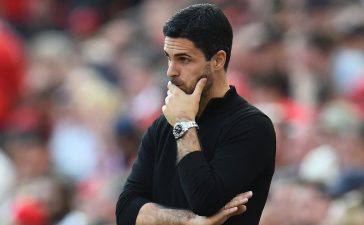And with that, the hearing is done for the day. This week of lawyers at the inquiry comes to an end, although there are several more still to come in the coming weeks – not least Brian Altman KC next Wednesday and Simon Clarke next Thursday. We’ll be back to cover them.
3.45pm: There is only one core participant who actually wants to ask Singh any questions, which is unusual. Angela Patrick, representing sub-postmasters including Jo Hamilton, takes Singh to the decision to apply for public interest immunity on the eve of a trial in 2013. This sought to prevent the Post Office from disclosing to defence lawyers that the Second Sight interim report was being published.
Barrister Simon Clarke, who made the application, recorded a note saying the decision to pursue PII was taken ‘in conjunction’ with Singh (see below). He says he was not involved in the decision making and does not really know what it was. Patrick suggests this is more evidence of Singh seeking to cover up the truth about Horizon. He rejects this.
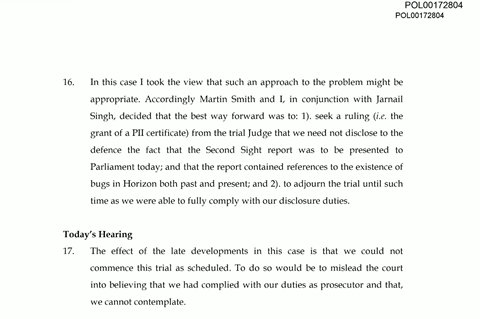
3.30pm: Beer finishes by asking whether Singh was ever curious or wondered why he was not being asked for information about the Horizon issues being uncovered and in particular problems with expert evidence. Singh says it never crossed his mind and adds: ‘I was a criminal lawyer dealing with the cases as and when they came in.’
3.25pm: The inquiry sees records of a meeting between Singh and prosecutors in Scotland. The issues with Gareth Jenkins were not discussed or brought up, even though Post Office lawyers knew them by that stage.
Beer asks if anyone in the legal team thought to bring up the problem of expert reliability with the board. Singh says he has no idea and repeats his assertion he was just a ‘postbox’. Beer says this was the Post Office’s ‘dirty secret’ that they wanted to hide.
3.10pm: Beer really driving this point home. Brings up another email from Singh to head of legal Hugh Flemington from December 2013. This states that one of the new expert’s key aims would be to ‘provide a validated opinion as to the present integrity of the system so as to lay to rest the present concerns relating to the integrity of Horizon Online’.
Singh tells the inquiry he does not know why he said this. He does not accept he was foreshadowing the expert’s opinion.
3pm: Beer says it is clear from the documents that the Post Office’s approach was that they didn’t want any new expert to discover anything wrong with Horizon, and if they did, their appointment would be terminated. Singh, who is audibly sighing repeatedly, denies this was true.
2.50pm: With Jenkins out of the picture, Post Office lawyers discussed bringing in a new expert. An email from Singh shows that he believed any instruction would be ‘on the proviso that they immediately notify Cartwright King of anything which may cause POL concern. It will enable the process to be terminated without full costs being incurred’.
Beer says the clear indication from this is that the Post Office intended to sack any expert who told them something uncomfortable. Singh says that ‘absolutely not’ the intention, but Beer replies these were ‘your words’.
2.35pm: A major revelation and one of Singh’s most uncomfortable moments so far. The inquiry sees an email chain where Post Office leaders are discussing whether to disclose investigators’ reports as part of the mediation process in 2014.
Singh says that in relation to the former sub-postmistress Jo Hamilton (pictured below), he had no doubt that disclosure would have been an ‘extremely dangerous approach’. Hamilton was fighting to clear her name and clearly, suggests Beer, would have benefitted from knowing there were deficiencies in the case against her.
The solicitor tells the inquiry he had not even read the Hamilton file when he wrote this email. This prompts Beer and chair Sir Wyn Williams to ask incredulously how he could possibly have quoted directly from it if he had not read.
Singh takes long pauses as he tries to explain what was happening. He says this email was just him ‘weighing’ up the arguments over disclosure of investigators’ reports.
Beer says this is proof of a cover-up, which Singh denies.
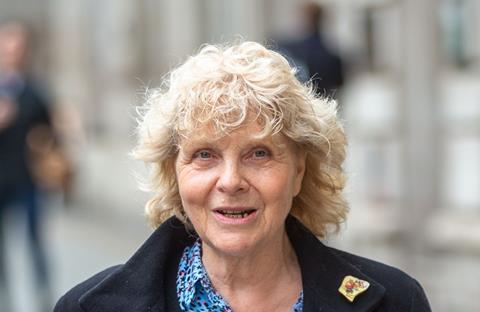
2.25pm: When Second Sight was appointed, Singh was asked to provide an explanation of why this was happening so a line could be provided to the courts and defence lawyers. He referred to it in an internal email as ‘our story’.
Emails show this message was passed through the Post Office head of PR and made its way into numerous witness statements which were presented to court. On each occasion the statement used Singh’s words: ‘When the system has been challenged in criminal cases it has been successfully defended’.
Singh says it was wrong that witness reports were submitted that had been seen and amended by the head of PR, but says he was not responsible for this.
2.10pm: Here we go again, then. Beer takes Singh to an email he sent to a colleague in which he referred to cases where it is ‘immediately apparent that criminal investigation should be commenced with view to prosecution to protect POL brand and reputation and in the interest of the business’.
Beer asks whether brand protection was a message he wanted to emphasise. Singh says not him personally.
Beer then shows another Singh email, this time to executive director Angela van den Bogerd, in which he says the Post Office needs to investigate ‘with a view to potential prosecution to protect POL brand and reputation and for business purposes’.
Beer says the wording is almost identical and asks again if Singh was concerned with reputation management. He says these emails were discussion papers and he wasn’t personally trying to protect the Post Office brand.
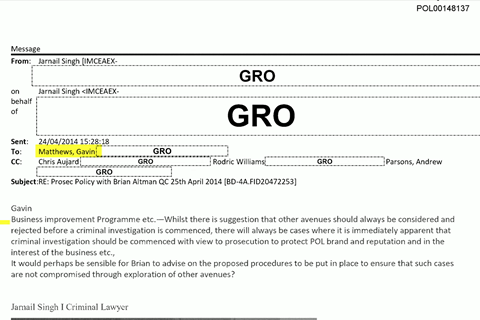
1.15pm: Final topic before lunch is this email from February 2013 in response to a question to Singh about whether to drop a fraud prosecution against a sub-postmaster. Singh said this was acceptable so long as he pleaded guilty to false accounting but also accepted that he did not challenge the integrity of Horizon or blame the system for shortfalls in the branch accounts.
Beer asks why this caveat was necessary.
Singh says it was the established position of the Post Office and that it was beneficial to the defendant as well. He cannot recall whether any other sub-postmasters had tried to cite Horizon in their pleas.
He says it is ‘painful’ to hear that people were forced into making guilty pleas to false accounting but asserts that he was not the ultimate decision-maker.
We go to the lunch break.
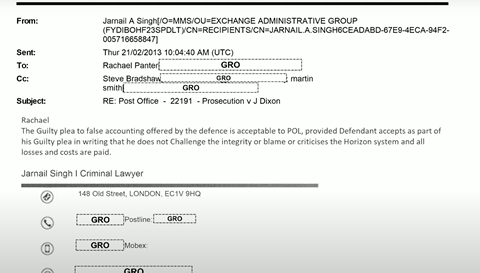
1.10pm: Singh is pressed on whether it was his view that sub-postmasters saw the Post Office as a ‘bank’. He admits this was a ‘naive’ thing to say. He denies this reflected the views of the organisation but concedes that he was approaching Crichton’s question through a ‘business lens’.
1.05pm: The inquiry sees an email from Singh in response to Susan Crichton, asking whether there are any risks with stopping prosecutions. Singh’s response in June 2012 was very strong, warning that any decision not to prosecute ‘may open post office [sic] to criticism and undermine faith in horizon’.
Singh denies now that he saw prosecutions as a way of maintaining faith in Horizon. He says there needed to be a consistent approach, but Beer points out this is a separate issue.
1pm: More discussion about the John Scott instruction to shred or scrap minutes of weekly Horizon meetings. Singh concedes that after he relayed this to Cartwright King, the matter does not appear to have been escalated. He recalls that Post Office general counsel Susan Crichton asked why he did not tell her rather than going to external lawyers.
Singh says it was ‘scary’ that this advice was issued and he should have done more. He remembers going for a walk round the block and considered leaving the organisation as he was so upset about it.
12.55pm: Singh immediately called Martin Smith from Cartwright King to tell him about this shredding advice from inside the Post Office. He also emailed the next day raising a separate issue: namely that there was a school of thought in Post Office that as long as minutes were not taken from meetings they were not disclosable. Singh names Bond Dickinson’s Andrew Parsons as being responsible for this advice. Parsons appears before the inquiry in June.
12.45pm: Singh is clearly physically struggling here, rubbing his head and often closing his eyes.
He describes the shredding advice from John Scott as ‘deeply concerning’ and told Dave Posnett this must not happen. ‘I probably swore at him and said “what are you doing and what are you thinking”?’ recalls Singh.
12.40pm: When we return, we go straight to Singh’s witness statement where he states that senior members of the Post Office security team were discussing destroying minutes of weekly meetings that were used to discuss Horizon issues.
12.30pm: The inquiry returns after a break and Beer asks whether the Post Office was worried by 2013 about being implicated in problems linked to Jenkins’ evidence. Singh says he does not know about this and suggests his role was as a ‘postbox’ relaying information from one place to another.
Beer then turns to the issue of documents being shredded, but Singh says his eyes are hurting and requests a short break. The chair agrees and pauses proceedings for five minutes.
12.15pm: Inquiry focuses on the Simon Clarke advice from July 2013 which concluded that expert Gareth Jenkins was a discredited witness who had not disclosed details of bugs with the system.
Singh is asked if he failed to ensure Jenkins discharged his duties and agrees.
‘[Jenkins] came in as an experienced person who came to assist the defence expert,’ says Singh. ‘We notified the court and defence that we were going to rely on a Fujitsu employee. We probably made mistakes and somewhere along the line somebody should have realised that he was an expert and [witness] and we should have notified him of his obligations and failed in that… it was a failing and mistake on my part, I accept, but we have the systems and procedures in place to deal with it.’
Singh says he had not dealt with an expert witness since 1990 and denies this was a strategy to ‘lump this all’ on Gareth Jenkins.
12.05pm: Really awkward moment as Beer starts to ask about the state of play in July 2013.
Singh says: ‘Whatever you are suggesting is not true.’
Beer points out he has not actually suggested anything yet, but latches onto the comment by asking if Singh’s default position in giving evidence is just to deny everything is true.
Singh says: ‘I am trying to listen and understand where you are going.’
11.55am: The inquiry hears that Singh was asked by senior colleagues in 2013 to prepare a briefing on the Lee Castleton civil case from 2006. He does so, but adds – apparently unprompted – in a long explainer on the Seema Misra trial from 2010.
Beer suggests Singh was seeking to justify why the Misra outcome was a vindication of Horizon, adding that ‘you started to understand that Misra was going to be a problem for you’.
Singh denies this, and adds: ‘I am grieved that [Seema Misra] had to suffer. I am doubly grieved because mistakes were made and she had to go through it.’
11.45am: The inquiry sees a series of emails from July 2013 between Singh and Gareth Jenkins. This was a week before the publication of the potentially damaging Second Sight report. Singh asked Jenkins for a copy of his expert report in the Misra case and for details about bugs.
Beer asks whether this was an example of the ‘scrabbling around’ in Post Office ahead of the Second Sight report. Singh says ‘nothing could be further from the facts’ and he was just doing his job of collecting information as requested by the head of legal.
11.35am: A further email from February 2010 sees Singh ask expert witness Gareth Jenkins to mention in his statement whether there are any known problems with the Horizon system (see below). The reply from Fujitsu’s lawyer was that Jenkins did not feel able to give an answer as yet.
Beer asks Singh whether this reluctance to give an answer set off any alarm bells. Singh replies that he was confident the issue was being dealt with and he trusted the expertise and experience of Jenkins to make the right call.
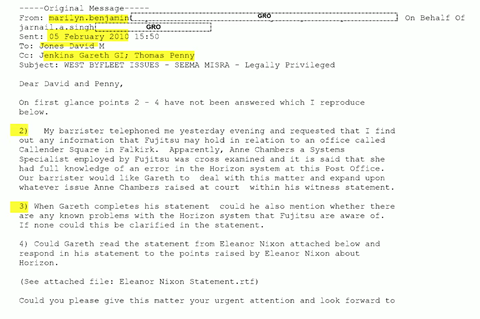
11.25am: Then another damning email, this time from Post Office civil lawyer Mandy Talbot to Singh days before the Misra trial.
Talbot says that two senior Post Office staff are ‘very interested in any developments’ and that Singh had ‘promised to let me know if anything unfortunate occurred in respect of Horizon’.
Singh states that he did not know the two people referred to and says he probably had a ‘glancing conversation’ with Talbot, but he does not recall what was said.
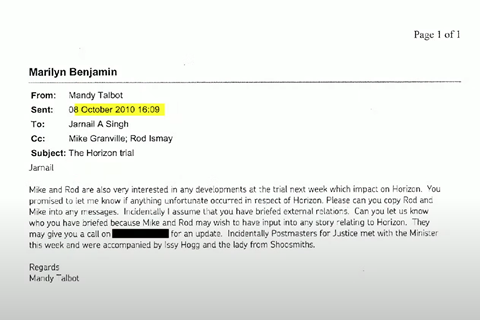
11.20am: Back after a break and Beer is back onto the issue of internal emails and documents being passed around immediately before the Misra trial, which was clearly of wider importance to the Post Office. Beer suggests Singh’s assertion that he did not read many of these documents is a ‘big fat lie’.
Singh responds: ‘I didn’t come here to lie. I am at an age where I have come here to assist the inquiry.’
11am: The attached documents discussing a bug were saved onto Singh’s hard drive and printed nine minutes after he received the email. Again, Beer stresses, this was mere days before Seema Misra’s trial but nothing was disclosed to her defence solicitors.
Singh denies ever printing out the documents and says he did not know at the time how to save anything to his computer. He reiterates he was not involved in a cover-up either in 2010 or the subsequent years.
10.50am: You sensed this was coming. The inquiry is shown an email which was forwarded to Singh which had been written by a member of the Post Office security team. It was from October 2010 – the week before the trial of Seema Misra.
The email clearly states that there had been a ‘series of incidents’ identified by Fujitsu where it appeared that discrepancies in branch accounts ‘simply disappear’.
Singh says he has no recollection of reading or receiving this, despite the inquiry seeing he was emailed this information.
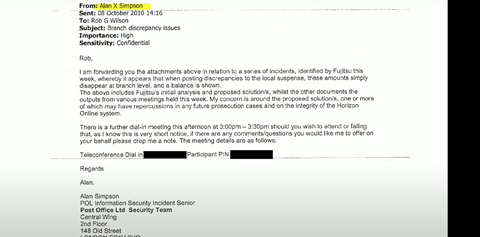
10.45am: Very tense here. Beer suggests Singh was part of a group that doubled down – not only failing to give disclosure but seeking to cover that up. It would take years for Seema Misra to have her conviction overturned.
‘There is no way I would ever cover up something of that magnitude,’ Singh says.
10.40am: Beer presses on with the issue of whether Singh failed to disclose the existence of a bug to Misra’s defence team. The solicitor repeats his assertion that his knowledge was ‘very limited’ and say he doesn’t recall.
Beer: ‘Do you accept your claims that the first you became aware of a bug in 2013 were false?’
Singh: ‘That is not true.’
Beer: ‘You had known about the bug all along hadn’t you?’
Singh: ‘That is not true.’
Beer: ‘You were covering it up in 2013 and 2015.’
Singh: ‘No I was not covering it up.’
10.30am: You get the sense that Beer has been teeing up this issue of prior knowledge of bugs with his opening questions. He moves onto a straight question: ‘Do you accept that in fact shortly before the trial of Seema Misra [in 2010] you were made aware of the receipts and payments mismatch bug?’
Singh responds: ‘I can’t recall, I don’t remember anything around that.’
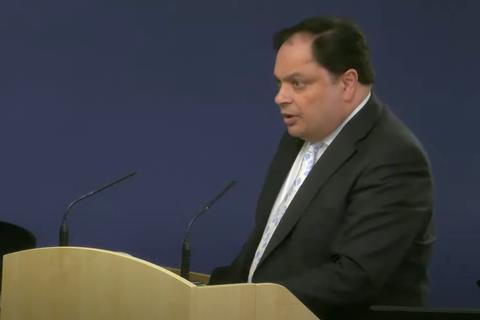
10.25am: Beer asks Singh to focus on his questions. He asks repeatedly whether it would be more than embarrassing if it emerged that lawyers knew about Horizon bugs before the Second Sight report. Singh responds: ‘It is embarrassing being here.’
Beer presses on, and Singh concedes: ‘I would hope it didn’t happen that way.’
He denies he knew about bugs and says again his involvement was limited.
10.15am: The email also contains a line where Singh said it would be ‘highly embarrassing for POL were it to be suggested that Fujitsu had informed some part of POL and that information never reached the security team’.
Beer asks why it would be embarrassing. Singh stumbles over his answer and says he does not understand what the question is getting at. He repeats that he was going by the advice from Post Office head of legal and external firm Cartwright King.
‘I am not sure what I am actually saying there,’ he adds.
10.10am: The inquiry sees an email written by Singh to various people at the Post Office in 2015, discussing the potential response to a BBC investigation.
Singh says the Post Office is ‘entering dangerous territory’ and says he was not aware of any bugs, errors or defects with Horizon until a day before the publication of the Second Sight report in 2013. Beer wants to push at this assertion, asking if Singh is asserting that he had no knowledge of a bug pre-2013.
Singh does not answer the question directly, saying his involvement in this issue was ‘very limited’ and he did not have experience in dealing with such matters.
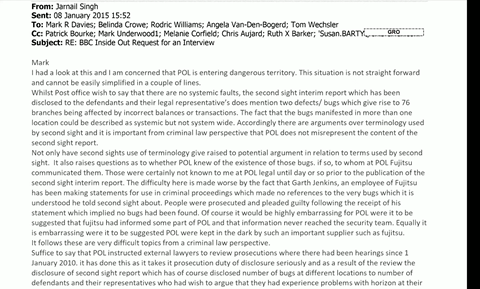
10am: Beer hones in on this issue of Singh’s knowledge about bugs. The advice from Simon Clarke in July 2013 stated that Singh, who was head of criminal law, had been unaware and had not known how long Post Office Limited had known of the existence of bugs. Nor indeed did he know if anyone at Post Office was aware.
Then a surprise turn. Singh admits he did know of two bugs relating to the Seema Misra case in 2010, that dated back some five years. It is unclear what he is referring to.
9.55am: Inquiry counsel Jason Beer KC goes straight in from the off, asking Singh if he and the Post Office were involved in a cover-up about knowledge of bugs, errors and defects with the Horizon IT system. Singh says he was not.
9.50am: Singh swears an oath and is reminded by the chair Sir Wyn Williams about his right not to answer questions that may incriminate himself. He has submitted a 42-page witness statement.
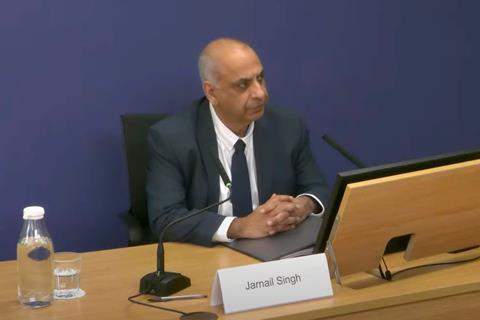
Former Post Office criminal solicitor Jarnail Singh returns to give more evidence to the inquiry, after his two-day appearance last year. He was a key figure in prosecutions and the Post Office’s response to the growing concerns about Horizon.







